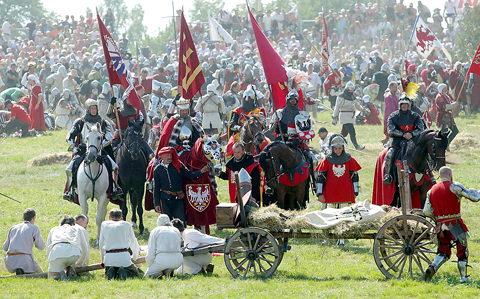Thousands of fans of the Middle Ages on Saturday donned their tabards and lowered their visors to relive the heady days of 1410, when a Polish-Lithuanian army smashed the Teutonic Knights.
On the real site of the Battle of Grunwald, some 2,200 re-enactors clashed head on as they marked the 600th anniversary of what is seen as a tide-turning moment in the region’s history.
Battling in stifling heat, the knights, archers, cavalry and halberd-wielding footmen were watched by what police said was a crowd of up to 200,000.

PHOTO: EPA
Grunwald, in northern Poland, is a magnet for fans of all things medieval, who flock here every July to don itchy flax clothes, codpieces and chainmail, quaff mead, and enjoy a good ruck.
The battle is serious stuff. Although the knights’ swords are blunted, they barely pull their blows in a full-throttle skirmish.
“I got this in training [on Friday],” a knight named Janek said, pointing to a plaster cast on his left arm which was just visible under his armor.
“But it didn’t stop me getting stuck right in again [on Saturday],” he added, grinning as he lurched to his feet with a clunk of metal.
Serious injuries are relatively rare, with dehydration and heat-stroke a greater worry, participants said.
The battlefield rang out to the sound of bombards — early cannons — whose blast and acrid black-powder smoke failed to faze the horses of a charging unit of lancers.
Nearby, Monika Iwanska, 17, carried a wooden bucket of water to a group of slumped knights. The only concession to modernity was a clutch of drinking straws — supping water through a visor is not exactly simple.
“It’s my first time here,” Iwanska said. “I got into this because my boyfriend’s a knight.”
“The atmosphere’s really great. But it’s about more than that, because I really like the Middle Ages and you learn [a] lot about the past by living it for real,” she added.
Tomasz Konopka, commander of a “banner,” or medieval military unit, kept staunchly in character, haranguing his troops.
“Form up! You call that a line?” he yelled, whacking an errant knight with the flat of his sword.
The original battle on July 15, 1410, helped speed the decline of the mainly-German Order of the Teutonic Knights, warrior-monks who wielded power along the Baltic coast from the 13th century.
Victory fueled the rise of a powerful Polish-Lithuanian united state which lasted four centuries, and the battle enjoys iconic status in both nations today.
Jaroslaw Struczynski, who acts as the Teutonic Knights’ Grand Master Ulrich von Jungingen, was booed by the crowd as he rode sneering onto the field.
“I figured someone had to play him,” Struczynski said ahead of the battle.
Von Jungingen died in the battle, so Struczynski, one of the founders of the re-enactment, has had to hit the deck more than a dozen times.
What started as a low-key gathering of Polish Grunwald fans in the early 1990s has spiraled into an ultra-authentic event which organizers say is Europe’s largest knightly re-enactment.
Along with participants playing peasant levies and camp-followers — who take the total number to 6,000 — the knights spend a week camping out living history-style.

Swedish campaigner Greta Thunberg was deported from Israel yesterday, the Israeli Ministry of Foreign Affairs said, the day after the Israeli navy prevented her and a group of fellow pro-Palestinian activists from sailing to Gaza. Thunberg, 22, was put on a flight to France, the ministry said, adding that she would travel on to Sweden from there. Three other people who had been aboard the charity vessel also agreed to immediate repatriation. Eight other crew members are contesting their deportation order, Israeli rights group Adalah, which advised them, said in a statement. They are being held at a detention center ahead of a

A Chinese scientist was arrested while arriving in the US at Detroit airport, the second case in days involving the alleged smuggling of biological material, authorities said on Monday. The scientist is accused of shipping biological material months ago to staff at a laboratory at the University of Michigan. The FBI, in a court filing, described it as material related to certain worms and requires a government permit. “The guidelines for importing biological materials into the US for research purposes are stringent, but clear, and actions like this undermine the legitimate work of other visiting scholars,” said John Nowak, who leads field

‘THE RED LINE’: Colombian President Gustavo Petro promised a thorough probe into the attack on the senator, who had announced his presidential bid in March Colombian Senator Miguel Uribe Turbay, a possible candidate in the country’s presidential election next year, was shot and wounded at a campaign rally in Bogota on Saturday, authorities said. His conservative Democratic Center party released a statement calling it “an unacceptable act of violence.” The attack took place in a park in the Fontibon neighborhood when armed assailants shot him from behind, said the right-wing Democratic Center, which was the party of former Colombian president Alvaro Uribe. The men are not related. Images circulating on social media showed Uribe Turbay, 39, covered in blood being held by several people. The Santa Fe Foundation

NUCLEAR WARNING: Elites are carelessly fomenting fear and tensions between nuclear powers, perhaps because they have access to shelters, Tulsi Gabbard said After a trip to Hiroshima, US Director of National Intelligence Tulsi Gabbard on Tuesday warned that “warmongers” were pushing the world to the brink of nuclear war. Gabbard did not specify her concerns. Gabbard posted on social media a video of grisly footage from the world’s first nuclear attack and of her staring reflectively at the Hiroshima Peace Memorial. On Aug. 6, 1945, the US obliterated Hiroshima, killing 140,000 people in the explosion and by the end of the year from the uranium bomb’s effects. Three days later, a US plane dropped a plutonium bomb on Nagasaki, leaving abut 74,000 people dead by the